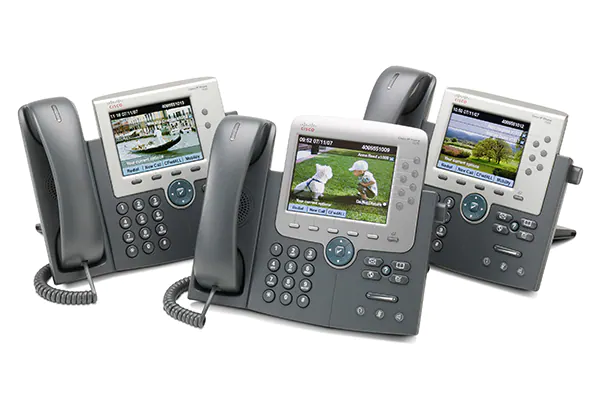
Selecting the ideal IP phone for a business is an important decision that impacts communication, collaboration and productivity. With so many options available from top manufacturers, it can be challenging to determine which features are most essential and which models are the best fit. This article provides buyers with a comprehensive guide to choosing IP phones that align with both short-term and long-term business needs. We’ll cover key factors like audio quality, deployment environment and voice/data security. Examples of various phone types, compatibility details and popular brands will also help businesses make an informed selection.
What is an IP Phone?
IP phones are standard telephones that connect to your phone service provider using your internet connection instead of traditional phone lines. They work by transmitting audio data as both voice and signaling through the internet using Internet Protocol (IP).
IP phones allow for clearer calls than standard landlines since calls are transmitted digitally over your internet connection rather than being converted from analog to digital and back again along public phone networks. This digital transmission results in better audio quality even over long distances.
While traditional phones connect to the telephone network via analog phone lines, IP phones require an internet connection and are configured through an IP private branch exchange (PBX) phone system or VoIP provider to access essential calling features like voice mail.
Key Features to Look for in an IP Phone
Some key features to consider include HD voice quality, Power over Ethernet (PoE) support, customizable programmable buttons, video conferencing capabilities, and advanced call management tools.
HD voice quality and audio clarity are important for professional communications. Businesses should look for IP phones that support wideband audio and devices certified for HD Voice by the SIP Forum.
Power over Ethernet (PoE) compatibility eliminates the need for separate power supply cables and makes installation simpler. Look for phones that support 802.3af or 802.3at PoE standards.
Programmable buttons allow customizing features and assigning extension numbers for quick access. Video conferencing functions facilitate remote collaboration for sales or customer support teams. Call management tools like forwarding, hold, mute are essential for multiline phones.
FOR MORE INFORMATION CLICK HERE : lovers day gift
Popular IP Phone Brands
Leading IP phone manufacturers include Cisco, Poly (formerly Plantronics and Polycom), Yealink, and Grandstream. Cisco and Poly dominate the high-end enterprise market with widest feature sets. Yealink focuses on mid-market with competitive pricing especially Yealink T31P is available at affordable price in worldwide. Grandstream offers affordable reliability suitable for many small businesses. Evaluate specific models against your requirements from top brands.
Types of IP Phones
There are several form factors of IP phones to suit different workstyles:
Desk IP phones are ideal for office workstations with large color screens and keypads for all standard calling functions. Wireless IP phones provide mobility within a single office space while syncing with the desk phone’s extension. Softphones turn a PC or smartphone into a full-featured calling client by using desktop or mobile VoIP applications. Video IP phones enable face-to-face communications and screen sharing for collaborative projects.
Compatibility with VoIP Service Providers
When purchasing IP phones, ensure compatibility with your VoIP service provider. Phones must support the necessary internet telephony standards, especially Session Initiation Protocol (SIP). Check which phone models your providerqualifies and supports to ensure all advanced features like voicemail integration work seamlessly.
Scalability and Expansion Options
Consider how your telephony needs may change as business grows. Look for IP phone systems that allow gradual expansion through optional modules. For example, phones with extra ports can support wireless handsets or additional lines. Advanced models offer capabilities like built-in WiFi and Bluetooth for future-proof flexibility. Integrated expansion microphones allow for open office configurations.
Ease of Setup and Management
Ideally, IP phones should be plug-and-play with your network once configured. However, centralized remote management saves IT time and costs compared to configuring each phone individually. Advanced provisioning options allow bulk uploading of settings and firmware updates from a web portal. Look for simple models if lacking internal support.
Security Features
Encryption protects voice communications from eavesdropping along with authentication for call signaling. VPN connectivity allows secure calling for remote workers. Check if phones support standards like SSL, TLS for network security suited to your industry compliance needs.
Budget Considerations
Juggling features, quality and cost requires balancing needs against budget. Consider core required features first before extras. Budget models are fine for some staff while premium phones suit management. Multiline VPN phones suit road warriors; weigh support costs versus mobile softphone apps.
Choosing the Right IP Phone for Your Business
In summary, consider core features like audio quality and call handling, WiFi support for mobility, and PoE support for simple installation across different desk and conference room environments based on your usage. Check provider compatibility and review top manufacturer brands. Balance needs against budget to select IP phones that boost productivity for years to come while supporting future expansion with your business. With the right models, IP phones deliver professional communications for both small operations and large multinational enterprises.